We Tested 6 Radar Detectors to Find the Best
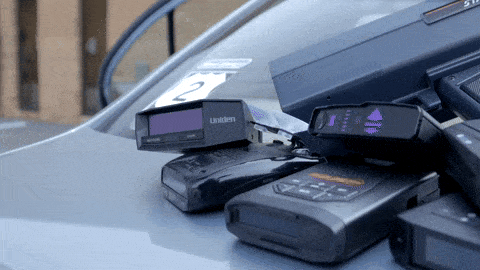
"Hearst Magazines and Yahoo may earn commission or revenue on some items through these links."
"Do you know how fast you were going?" We've all heard that before, and there's no good answer. Navigation apps such as Waze have gained popularity for sounding the alarm on potential speed traps, but they don't hold a candle to a good radar detector.
A radar detector is designed to identify nearby police radar guns, giving you ample time to decelerate and avoid a ticket. Detectors are tuned to detect the radio bands commonly used by police guns and alert you with a message about what band is detected. Knowing this, what's the best radar detector on the market? We put six to the test to find out.
How We Tested Radar Detectors
The Gear Team worked in conjunction with the Car and Driver editorial team to get comprehensive testing data on these radar detectors. We tried each detector on a seven-mile trip through an Ann Arbor strip mall gauntlet and counted false alerts, verifying them on the way back. Additionally, we tested the detection range with our own radar gun. Here's what we tested for:
Frontal detection range
Rear detection range
90-degree corner detection range
Number of false alerts along a seven-mile stretch
Installation
Usability
Quality-of-life notes
Remember, it's easy to get mired in test results when all you want to know is, "If I stick this on my windshield, will I get a ticket?" Any of these detectors will greatly reduce your odds of a chat with the roadside tax collector. Which one you buy depends on how you expect a radar detector to behave.
More Gear Tests: Best Backup Cameras | Best Home EV Chargers | Best Car Phone Mounts
The Best Radar Detectors
Uniden R8
The Uniden R8 comes out on top in our testing thanks to its ability to excel in just about every aspect of radar detecting. We love how it toes the line between being too chatty and suspiciously quiet—it's in that "just right" Goldilocks range and provides the highest confidence of any radar detector we tested.
The detection range on this thing is insane; second only to the Valentine. It was consistent across all three runs too—locking on at the 2.0-mile mark for frontal detection each time. With that much alert time in every direction, you'll have no problem adjusting.
Yes, the price is high, but the features speak for themselves. Auto-mute memory can filter out false alerts on your routes and is Spectre Elite undetectable—meaning, police who scan for radar detectors won't find it. Better yet, users get free firmware updates so the detector is always up to date.
If you're seriously looking to invest in a radar detector to whittle down those speeding tickets, the Uniden R8 is our choice for the Best Radar Detector Overall.
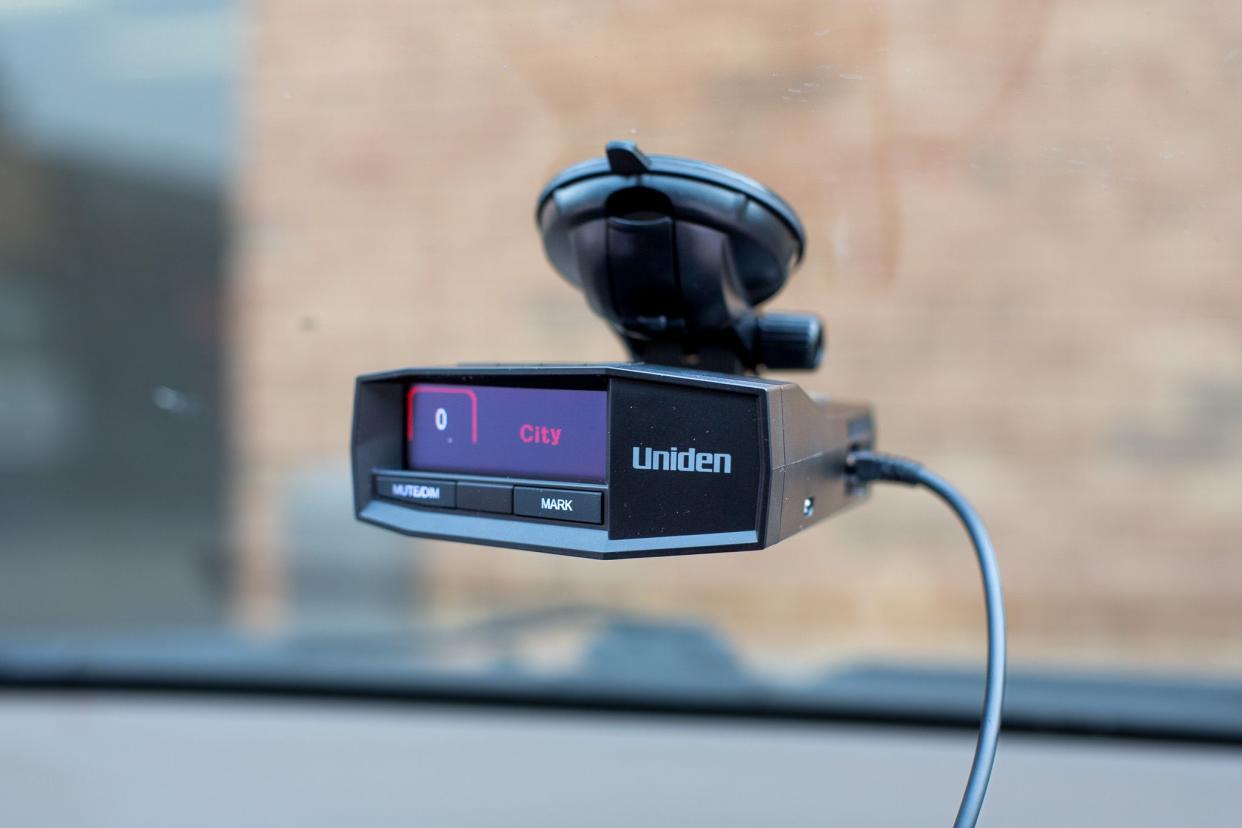
Uniden R8
amazon.com
$649.99
Gannon BurgettValentine V1 Gen 2
A long-time staple in the radar detecting game, we put Valentine's V1 Gen 2 up against the newbies. Right off the bat, the detection distances from this radar detector were the best of the bunch; its 2.1-mile rear detection is a half-mile farther than the Uniden R8's. Impressive stuff.
Setup is accomplished through the V1 Connection app, and the connection is accomplished via 5.0 Bluetooth, so you can hide the detector if you like.
Notably, the V1 Gen 2 is far and away the most chatty radar detector in this test. Some folks may see this as a nuisance, while others might appreciate the peace of mind from knowing this thing won't miss a sniff of any radar.
If you like to be alerted of every possible radar, this is the detector to get. If you prefer yours to be quieter and trust the false-alarm filtering, look elsewhere.
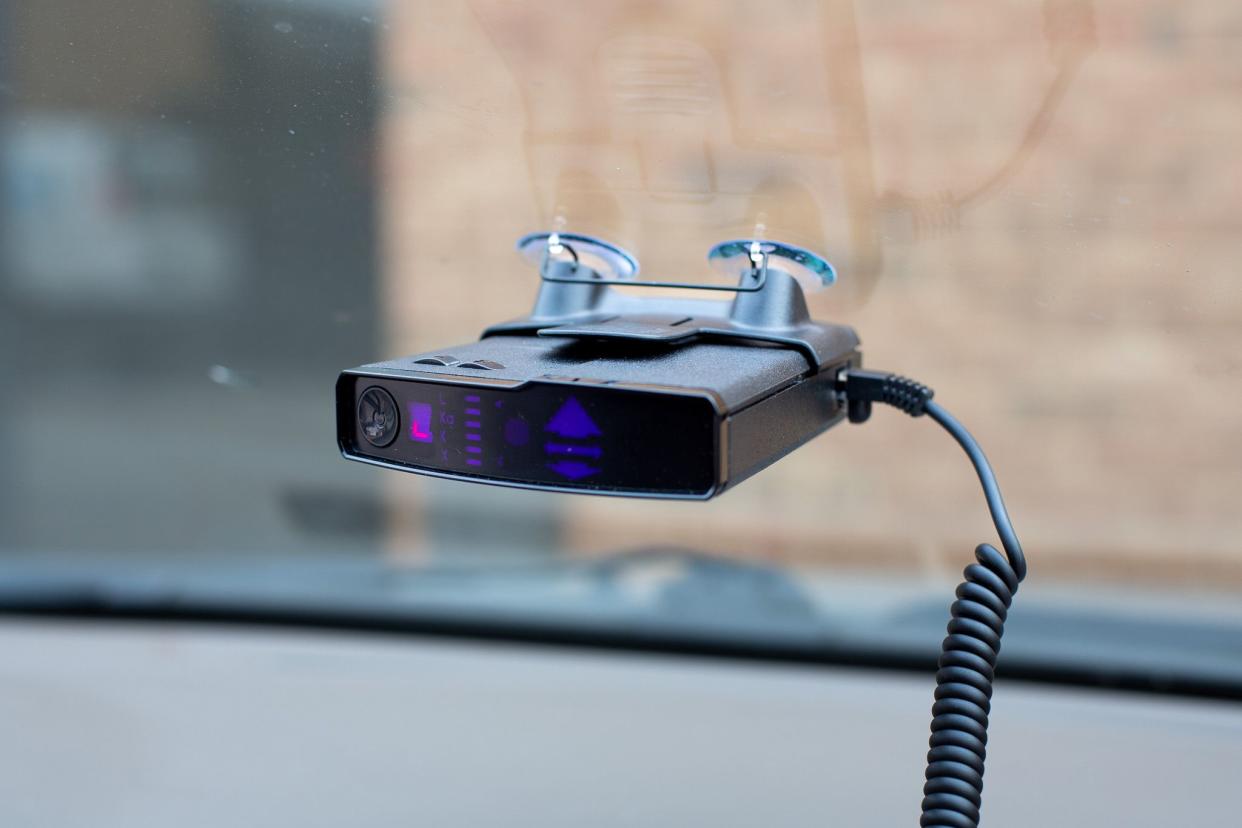
Valentine V1 Gen 2
amazon.com
$698.98
Gannon BurgettEscort Redline 360c
The Redline 360c is Escort's top-of-the-line radar detector, and its features (and price) prove it. It fared well in our detecting distance, not the best but far from the worst. Additionally, it threw just three false alerts—also right in the middle of the pack. Sensing a theme here?
The selling point of this radar detector is its plethora of features. Escort claims it's invisible to all radar detector detectors (RDD) and features an auto-learn mode to filter repeated false alerts. Escort's Drive Smarter app and community is really solid, featuring a sort of Waze-like navigation function to alert other users of staked-out cops. Escort even offers a ticket guarantee policy, something the Redline 360c qualifies for.
Frankly, for $800 we were hoping for better performance from the Redline 360c. Relative to the other devices we tested, it's fine but not great. Aesthetically, we do think this one looks the best—which, for a bunch of chunky gadgets, counts for something.
If you're into the advanced technology, enticing features, and slimline appearance, the Redline 360c is an excellent choice for a radar detector. But it'll cost you.
Note: Escort just dropped the latest evolution of their entry-level radar detector: the Max 4. It was released just after we concluded testing, so we're looking to include it in an upcoming update.
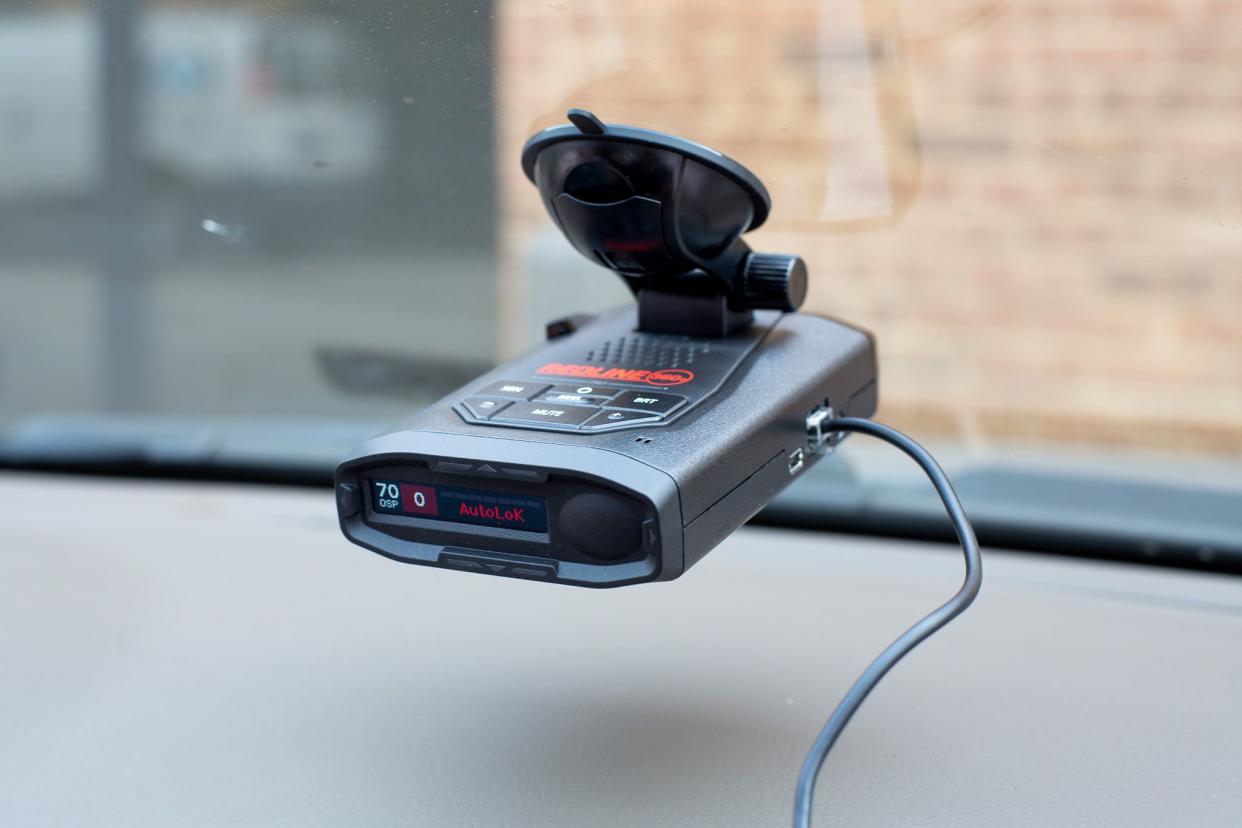
Escort Redline 360c
escortradar.com
$799.95
Gannon BurgettUniden DFR7
If you're simply looking for a no-frills, budget-friendly Smokey-sniffer, the Uniden DFR7 is a solid option. Obviously, it's lacking some high-end features like directional notifications and stealth against radar detector detectors. But it still does what it's designed to do, and for far less than most others here.
The detection ranges were all down from the rest of the competition, but not dangerously low. Surprisingly, the DFR7 offers GPS lockout, but it's a manual input rather than automatic. It's extremely quiet—only throwing two false alarms our way. Additionally, we had a gripe with the screen being tough to read, especially during a sunny day.
Despite its relatively subpar performance, this radar detector is indeed an incredible value. While we recommend investing in a top-of-the-line radar detector if you can, this budget radar detector is our pick for a solid value.
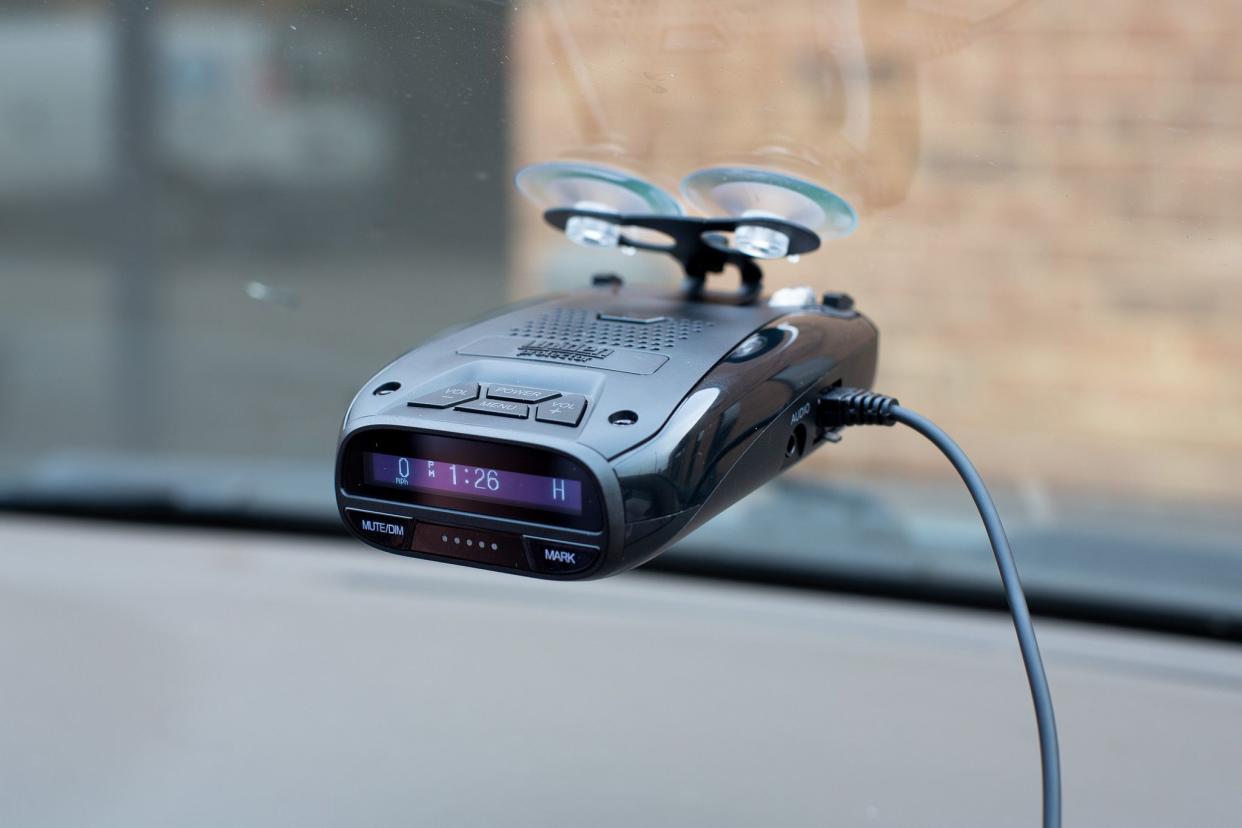
Uniden DFR7
amazon.com
$199.99
Gannon BurgettRadenso DS1
The Radenso DS1 is an excellent radar detector, though it doesn't outshine the rest in any specific category. The 2.0-mile frontal locked range is nothing to sneeze at, but it falls behind in both rear and 90-degree range. Two false alarms was a bit quiet for us, but this can be a benefit if that's what you prefer.
We loved the display screen—which auto-dims and is color-customizable, and the small size and overall sleek look is another bonus. The automatic GPS lockout feature shores up those false alerts, even if there are just a few to begin with. Finally, it's Bluetooth-compatible with Radenso's Nexus app for easy updates.
While there's nothing wrong with this radar detector, it doesn't stand out among the rest in any particular way. If you're a Radenso fan, this detector holds the legacy intact.
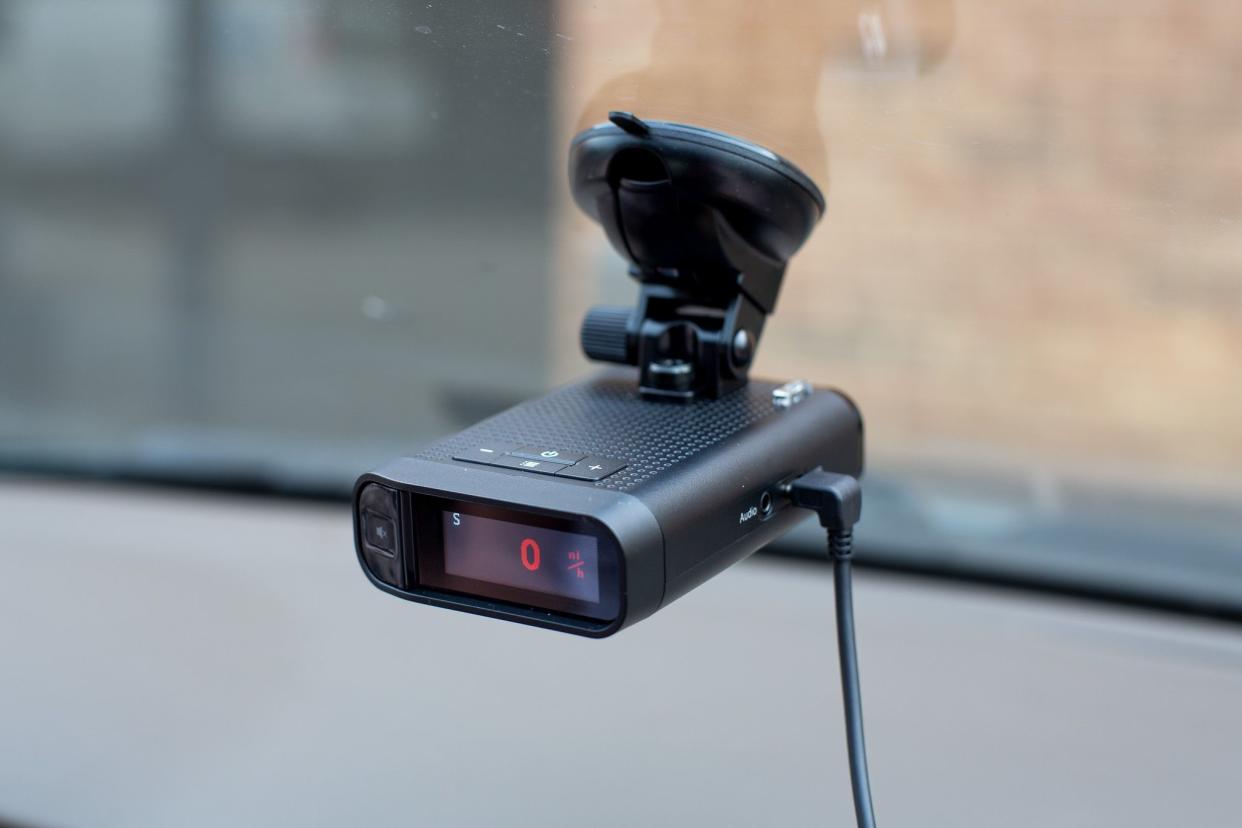
Radenso DS1
amazon.com
$339.95
Gannon BurgettDon't Buy a Budget Radar Detector
For kicks, we ordered a $25 radar detector to see how it fared against higher-priced models from established brands. We purchased one made by a company called Besworlds and tested it alongside all of the other radar detectors—and it failed to detect any sort of radar at all. (It has since been discontinued on Amazon.)
We cracked it open, only to find no evidence of any radar-detecting components—just some wires and a couple of circuit boards.
After a good laugh and lots of "why am I not surprised?" reactions, we wanted to make it clear how important it is to invest in a radar detector from an established brand. You don't need to spend a thousand bucks, but don't let a suspiciously cheap price entice you—avoided speeding tickets will pay for a quality detector faster than you might think. Get a good one from a brand you recognize, and enjoy the peace of mind.
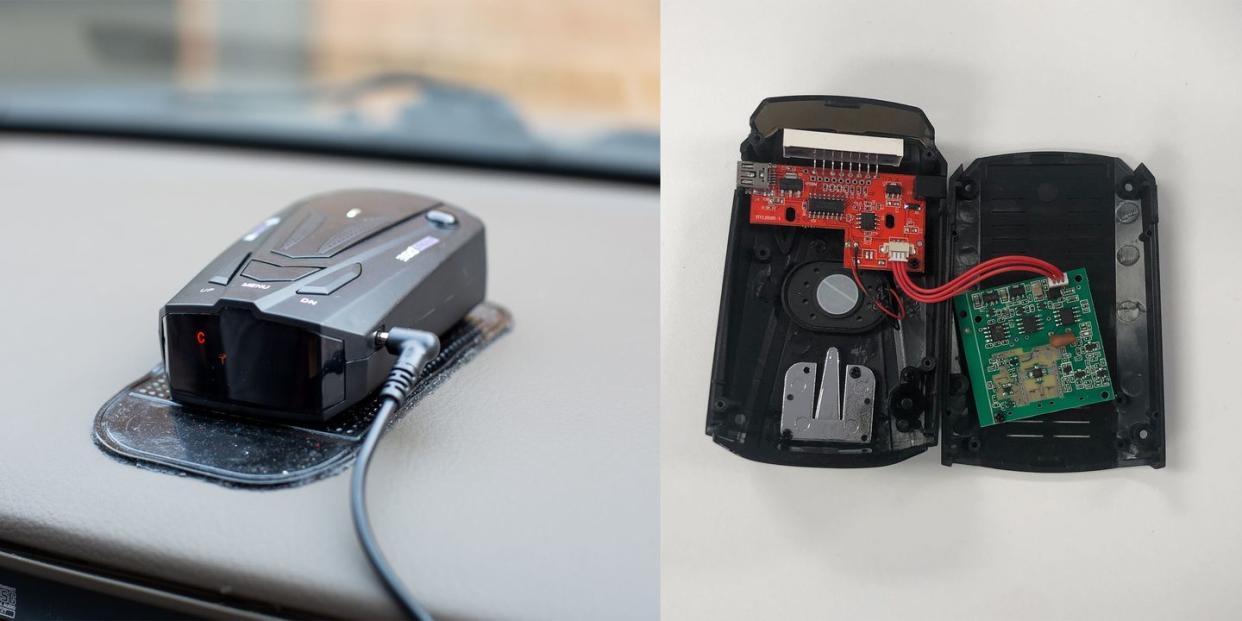
Things to Consider When Buying a Radar Detector
To understand a radar detector, it's essential to understand what radar and radar guns are. Radar is an acronym for radio detection and ranging and, just as the name suggests, is a technology that uses radio waves to "see" an object and determine its distance and velocity. Police radar guns emit different radar bands like X band, K band, or Ka band. (If you want to do a deep-dive, there's a thriving radar detector enthusiast community on Reddit.)
However, radar detectors are not cheap. Even entry-level models will cost two or three hundred bucks, and top-of-the-line models run closer to $1000 than $500. Before you plunk down your hard-earned cash on a radar detector, here are some things you should know.
Legality
For the most part, radar detectors are legal for use in personal vehicles in most U.S. states—but there are exceptions. Radar detectors are prohibited for use in the Commonwealth of Virginia and the District of Columbia. In Puerto Rico, radar detectors are legal in all passenger vehicles but illegal in commercial vehicles. North of the border, radar detectors are legal in British Columbia, Alberta, and Saskatchewan but illegal in all other provinces. That said, anyone considering using a radar detector should check their local laws, because this article is not legal advice.
Under U.S. federal law, the use of radar or laser speed detectors is illegal nationwide in all commercial vehicles over 10,000 pounds. This includes most 18-wheelers. In commercial vehicles under 10,000 pounds, radar detectors are allowed—except in Illinois, Minnesota, New Jersey, New York, Virginia, and Washington, D.C. Radar detectors are always illegal to use on any United States military base.
California and Minnesota have laws against devices attached to a windshield that obstruct the driver's view. No matter where you live, we'd advise against attaching any device to your windshield that a motor officer might construe as obstructing your view. It's a judgment call, but we prefer not to give the cops any reason to judge us or our vehicle.
Quiet vs. Noisy
False alarms are a big issue, so many manufacturers advertise their detectors as "ultra-quiet"—meaning, they filter out false alarms from motion-detecting doors on storefronts and blind-spot monitors from other vehicles. If your radar detector is not quiet, i.e., not good at filtering these out, you're in for an obnoxious drive that will give your heart a workout.
However, some folks might prefer their radar detector to sniff out and alert every possible radar signal on the road. While providing more noise, they're theoretically less prone to missing actual police.
Protection
Radar detectors will sometimes miss staked-out cops due to a variety of factors. Lidar is becoming more and more prevalent, and conventional radar detectors can't pick that up. These devices aren't ticket-proof—think of them more as a wingman in case you lose track of your speed. Even if they work most of the time, it's better than not having one at all.
Lidar
Lidar guns (more commonly referred to as laser guns) provide law enforcement with a virtually instant readout of your speed. Lidar is far more difficult to evade than traditional radar because it's nearly undetectable by radar detectors unless it's on and already measuring your speed—and by then, it's probably too late.
Crowdsourced apps such as Waze are actually quite handy at alerting you to a cop using a lidar gun than a windshield- or dash-mounted radar detector. If you really want to beat lidar, look into laser jammers.
Ticket Guarantees
Yes, some radar detector brands, like Escort and Radenso, offer ticket guarantees. Of course, there are a bunch of terms and conditions to comb through, but if you get a ticket while using one of their radar detectors, you might have a chance at getting that money back within a time period. It's something to keep in mind through your purchase process.
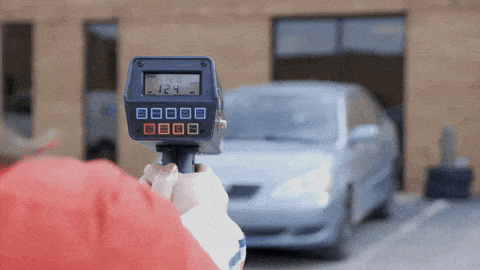
How We Tested Radar Detectors
We approached this test with two main parameters in mind: false-alert detection and overall detection range. For detection range, we took the radar detectors to the Car and Driver proving ground, and over three runs, we measured the front, rear, and approaching a 90-degree corner range average of each device with our own radar gun. We took notes on both initial detection (a blip) and locked detection (constant). Some radar detectors defaulted to "lock" right away, so we used that average number in the test results above.
To see how well each radar detector weeded out false alerts, we switched the detectors from their most sensitive mode to their most selective and rolled through Ann Arbor's strip-mall gauntlet. Without filtering, this drive is essentially a continuous, seven-mile-long alert due to the motion-detecting automatic doors from the dozens of storefronts that line the route. We marked false-alert locations on a map and verified those alerts by driving the opposite direction. In theory, most of these detectors are designed to learn where false alerts are and ignore them automatically, but we found it takes a few trips.
Finally, we took extensive notes on installation, how user-friendly each detector is, and other quality-of-life observations.
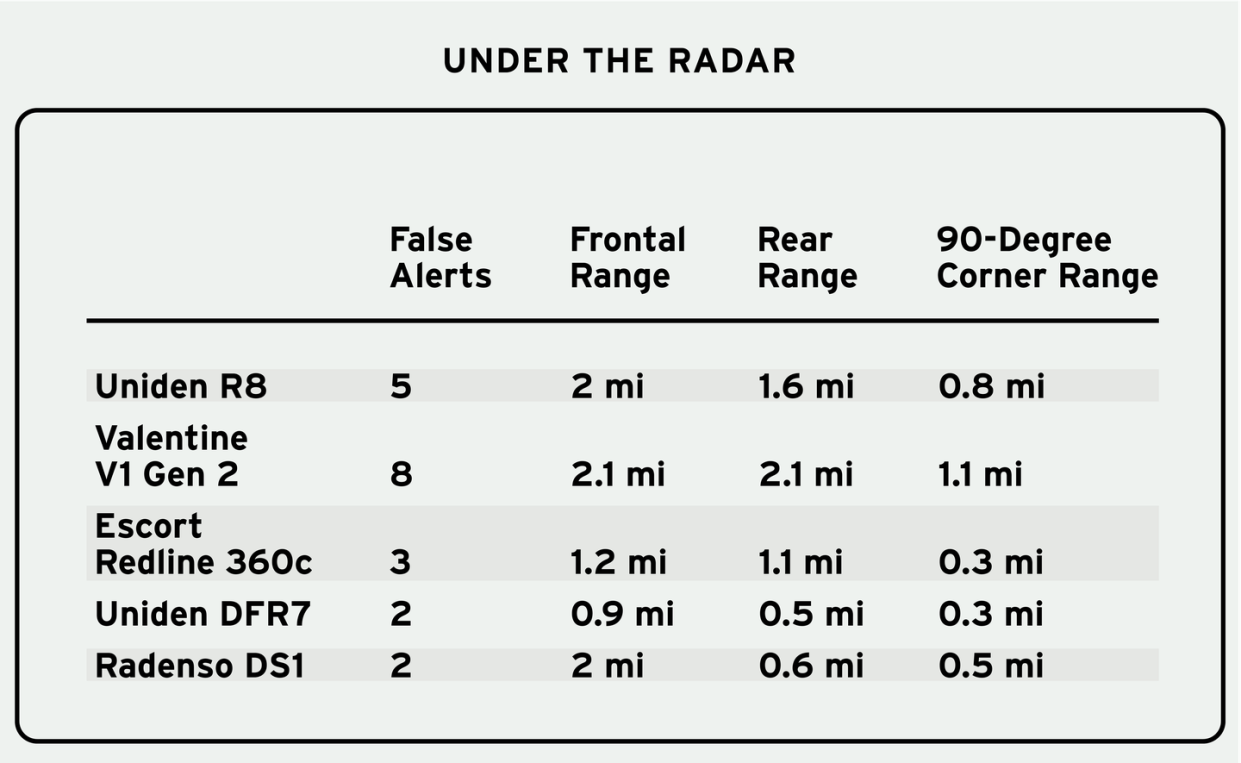
What's the Difference between Radar Bands?
X
X band alerts mean a radio wave has been detected within the 8.0-GHz to 12.0-GHz range. The X-band is the oldest radar frequency, and these days it's considered outdated if not altogether obsolete. For this reason, many radar-detector enthusiasts turn off the X-band alerts on their devices. However, we recommend keeping it on, since you can't be sure when the last time your local police or highway patrol upgraded their radar guns.
K
K band replaced X band back in the '80s and is the most widely used radar band in the United States, operating between 18.0 GHz and 27.0 GHz. When a K-band alert goes off, it may be the police. Still, it's also very possible it's a false alert triggered by various features like auto pilot, radar cruise control, and blind-spot-monitoring systems, since many of these systems operate on K-band frequencies.
Ka
Ka band is the latest and quickly becoming the most common radar band, typically found at 33.8, 34.7, and 35.5 GHz. In recent years, law enforcement has favored Ka-band because it is the most difficult to detect. Ka-band false alerts are uncommon, so if your detector throws a Ka alert, pay attention—it's probably the police.
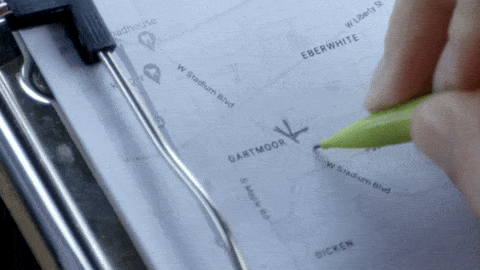
FAQs
Do radar detectors work?
They do. Whether yours is powerful or high-tech enough to detect police radar reliably every time is only part of the problem. There's no nationwide standard for police radar; an officer in rural Nebraska may still use 30-year-old X-band guns (don't ask us how we know), while urban police use Ka-band radar or even laser guns.
Conventional radio radar (X, K, Ka bands) is relatively easy to detect, and a basic radar detector should have no problem picking up these signals. Hopefully, your detector sounds the alarm in time for you to scrub enough speed before a radar gun can accurately measure how fast you were going.
Additionally, modern radar detectors often include a light-sensitive panel that detects laser beams from lidar guns, and some filter noise from motion detectors at businesses, blind-spot monitors on other vehicles, and even other radar detectors.
It's important to note that no radar detector is 100 percent effective; there's no guarantee that even with a radar detector on your dash, you won't get a speeding ticket. Radar technology is constantly improving and being upgraded—and so are radar detectors.
Think of your cellphone from just a few years ago versus the smartphone in your pocket today; much like your old flip-phone, your old radar detector may already be obsolete. Consider upgrading to one of the newer models spotlighted above.
Are radar detectors worth it?
Well, that's subjective. Radar detectors can cost anywhere from a couple hundred bucks to $700 or more, so it's no small investment. A lot of drivers swear by them, insisting their radar detector has paid for itself many times over. Others say they're a waste of money and that fastidious scanning of traffic for brake lights and a roof-mounted gumball is better practice.
We're not here to tell anyone how they ought to drive, but if you drive fast, speeding tickets are a very real risk. If you tend to speed regularly or just have bad luck with speeding tickets, a radar detector could be a solid investment.
What sets off radar detectors?
In addition to how an individual radar detector works and the type of signals it detects, a major difference between older radar detectors and newer, higher-end devices is the number of false alerts given. False alerts can be caused by anything that, like police radar, uses X-, K-, or Ka-band frequencies. This includes traffic monitors and roadside electronic warning signs for emergency vehicles. Modern radar detectors use advanced processing to filter out false signals.
Advanced Driver Assistance Systems (ADAS) common in many modern cars are among the biggest sources of false alerts these days. These include things like adaptive cruise control, lane-departure warnings, and blind-spot-monitoring systems. Such systems typically use K-band radio frequencies to determine how far away an object is from a vehicle, so just being near another car could set off your radar detector.
Automatic door openers are another source of false alarms—not just garage door openers but also the auto-door openers used by retail storefronts. If you're using an aged radar detector, simply driving past your neighborhood grocery store could set the thing off. If you're getting more false alerts than ever, that's a sign your radar detector may have outlived its usefulness. Consider upgrading to one of the devices above.
Why Trust Us
Hearst Autos combines the talent, resources, and expertise of three of the largest, most influential automotive publications in the world. The Gear Team has tested a wide variety of automotive products, parts, accessories, and gear, such as GPS trackers, OBD-II scanners, and dash cams. We get our hands on each and every product we test. Most are purchased; some are supplied by manufacturers.
The Gear Team doesn't need to game algorithms for traffic or promote lousy products for clicks. We're more concerned with our reputation and the trust that our readers have in Autoweek, Car and Driver, and Road & Track to deliver honest opinions and expert evaluations.
Visit our Tested & Trusted page to see the very best in automotive gear. Read more about our product testing and evaluation process here.
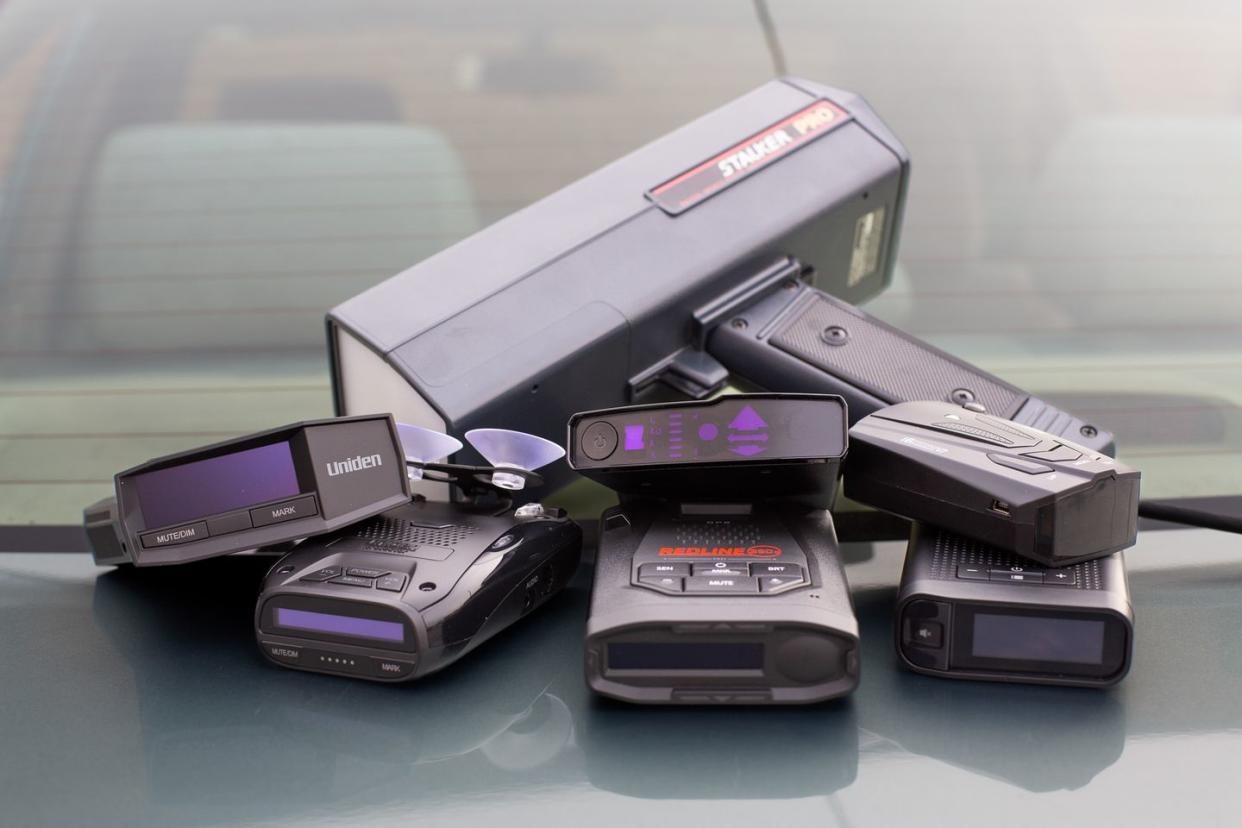
You Might Also Like
